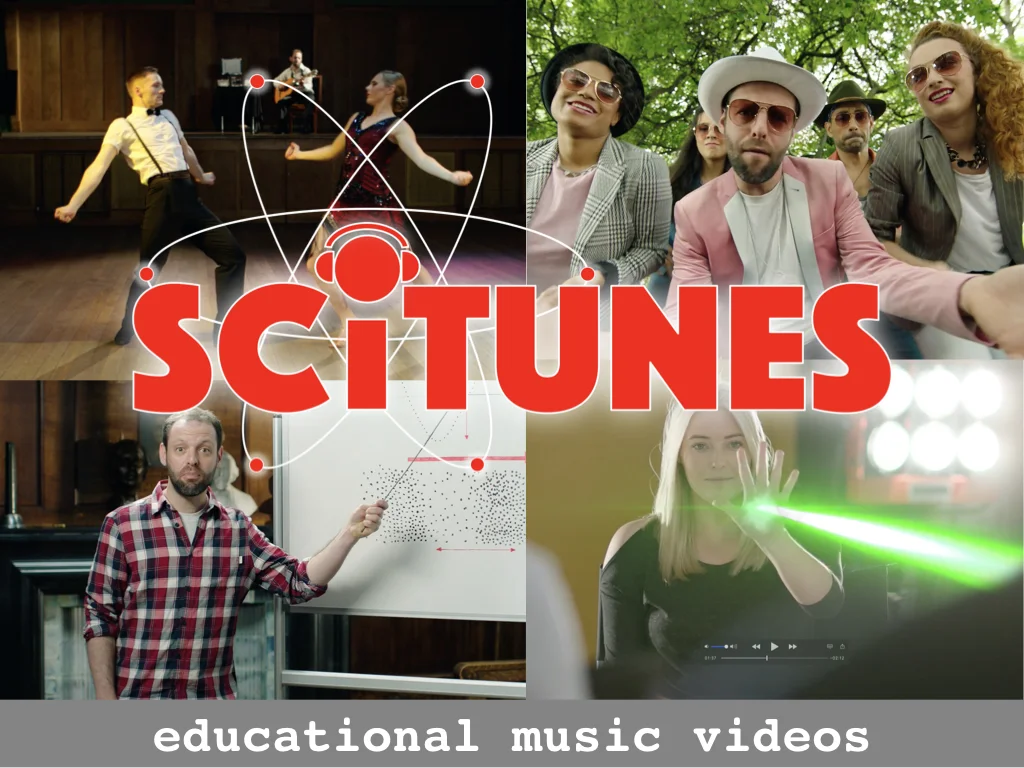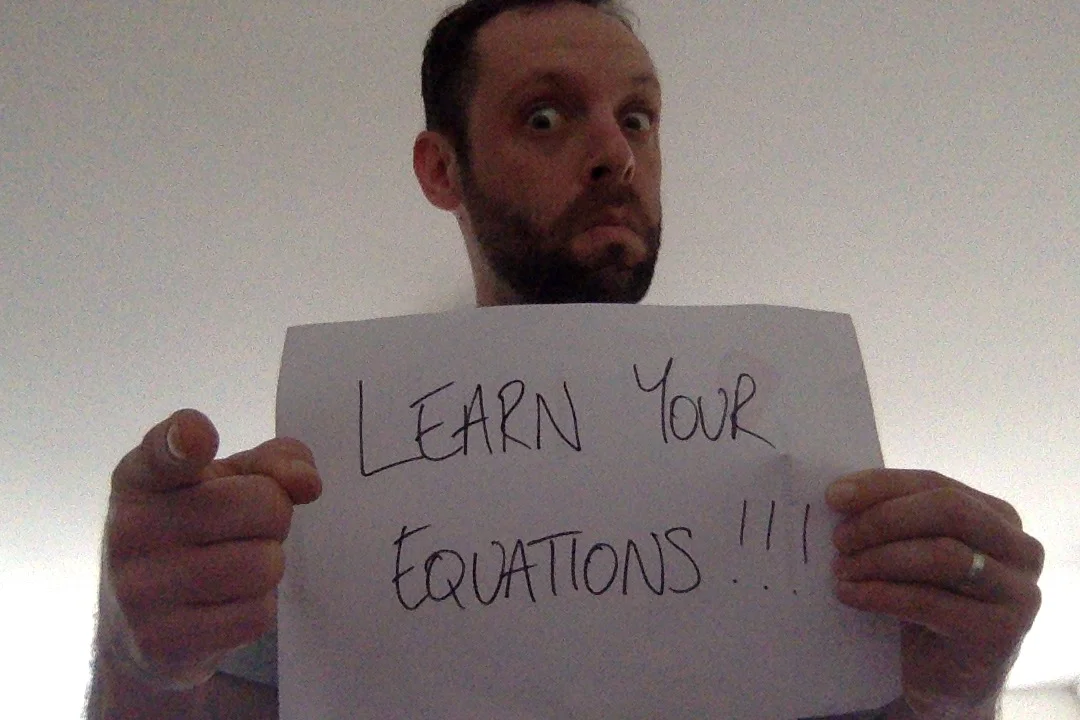Most people have an intuitive sense that songs help encode information. After all, you can probably remember the words to songs that you have not heard since childhood. Advertisers have been associating brands with tunes and phrases for years for this reason. There is not a great deal of research on the efficacy of using songs to teach science, but there is no shortage of wider research from neuroscience, psychology and sociology suggesting that it could be very effective. This is intended to be a brief run down of that research.
Read MoreMost students enjoy it when their teacher does something a little different to break up the lesson and our music videos are great for this, but they are designed to be much more than a bit of fun or an attention grabber. Here are six ways that the SciTunes music videos and accompanying worksheets can be used in the classroom to enhance learning, making the most of a song-based approach.
Read MoreThis week I launched the first of five new music videos directly related to the secondary physics curriculum. As the others are released over the next few weeks, the Sci Song Guy blogs will be devoted to using songs for revision and in the classroom. The songs, which will cover particle theory, electricity, radioactivity, forces, and waves have been funded by the Stephen Hawking Foundation as part of their mission to improve science education and increase participation.
Read MoreEvery year, the Association of Science Education (ASE) hosts one of the largest science education conferences in Europe. Last week, I went to get my fix of the latest research and practice, seeing too many talks to relate them all but for my first blog of the year I will write about the top four things I took away from it. Naturally, the talks I went to reflected my interests: using evidence based interventions, using arts and discussion based interventions to foster engagement and deep learning, and to communicate science in a way that addresses inequality. As a result, this may give a somewhat narrow view of the conference but pleasingly, these topics were all fairly high on the agenda so here they are..
Read MoreI have written before about how too much sci-comm preaches to the converted, and whilst there is nothing particularly wrong with telling interested folks about interesting stuff, it is hardly going to change the world. But it is hard to engage the non-interested. They simply don’t turn up to science festivals, or science discussions, or science museums, or anywhere we happen to be doing science engagement, so we have to go to where they are and do it on their terms. I recently found a perfect spot - the steam room of my local swimming pool.
Read MoreNext week, I'll be delivering a talk in Oxford about public engagement into research (PER), specifically how to make PER more engaging through song. The thinking and research that I have been doing have led me to really hone in what is meant by PER and so this blog is relevant for any researchers who are, or are thinking about getting into PER and thinking about how to maximise engagement opportunities. According to a report conducted by the National Co-ordinating Centre for Public Engagement, the vast majority of PER involves dissemination, whether through TV, blogs, books, articles, etc. It happens at the end of a research programme to tell the world about the findings. This is undoubtedly important since the public often fund the researchers work and it is important that they understand the outcomes. In many cases, research findings are important for the health and well-being of the public and sometimes research results in stuff that's just so darn interesting that it would be wrong not to let the public know. But how much do the researchers get back from this process and how engaged are the public going to be with this model? Not very much is the most probable answer.
Read MoreExam season is upon us. Anxious students are cramming an impossible amount of content to revise, and anxious parents either worry about their children's anxiety or that they aren't anxious enough to do the revision they should be doing. Teachers are anxious about whether they managed to cram in enough revision lessons and school heads are anxious that their results will be better than last year. It's the climax of the school year and exams are the ends for which almost all educational means are justified. "Why do I need to learn this?" ask the students. "Because it will be in the exam.", replies the teacher. And whilst almost everyone agrees that exams are unpleasant, we rarely question the fact that they are the best way achieve their aims. Much has been written about the problematic effects of high stakes examinations, particularly by John White, on their deleterious effect on student wellbeing and their tendency to destroy curiosity by making students only value knowledge that leads to exam success. It is generally accepted that the benefits must outweigh the costs. After all, educational reform after educational reform keeps GCSEs and A levels exactly the same in any meaningful sense. The latest reforms, with the harder-to-achieve top grades, extra content and extra emphasis on memorised facts actually make all problems associated with high-stakes examinations worse. So what is so great about exams?
Read MoreA big motivation for the revision songs that I have been writing is the new content heavy GCSE curriculum. There is a lot to remember and for the physics students they now have to remember 20 odd equations. In a meeting with the Institute of Physics a couple of years ago I outlined the benefits of using songs to remember facts such as equations. Their reaction was that they could not support the rote learning of the physics equations. This is sound educational thinking. The equations of physics provide a beautifully simple and consistent description of the universe and when you understand the physics and understand how equations are derived, the ability to remember and use them is far superior to when they have been learned parrot fashion. Since that meeting I have decided to go ahead and write a song that encourages the rote learning of these equations. I have tried to include as much explanation about the derivation of the equations but there are a lot and it would simply be too much for one song, but I decided to write it anyway for two reasons that I will briefly pick apart. The first reason comes from my experience as an educator, namely that rote learning, in a few situations, can actually be useful. The second comes from my conviction that getting GCSE students to learn physics equations is unnecessary and provides students with added stress and if a song can help then why not have one?
Read MoreThe Easter holidays are nearly over and for year 11 teachers and students this means one thing - revision, revision, revision. It can be a stressful time for teachers, students and their parents and it can be boring for students too. The new GCSE curricula for science are content heavy and students' memories will be stretched to the max. Sitting down and memorising facts is rarely fun but teachers will hopefully make the best of it by designing games and dynamic sessions for students to go over the enormous quantity of material in the short time left. If the sessions are boring then nothing gets remembered. If they are too slow then they run out of time to revise it all. So the challenge for teachers and students is to cram lots of information in without it getting boring. Students quickly tire of making mind maps and teachers struggle to find the time to make great resources but over the past year and a half, since I left the classroom, I have been working on a set of resources that might help! The struggle for parents is keep their kids on track without sounding like a nag.
Read MoreThis weekend I saw something amazing. I witnessed thousands of children and their parents choose to go to a university mechanical engineering department to spend a frenzied couple of hours getting down with slime. Anyone who has spent any time around any 8 - 16 year olds in the last few months probably knows how exciting this must have been for the youngsters. And if you don't understand what's going on, slime is the latest kiddie craze, and the Institute of Making capitalised on this fact to achieve an incredible piece of science outreach. I have seen dozens of science outreach events and I'm not sure I have ever seen so many young faces looking so excited. The place was mobbed. So what was the secret to their success?
Read MoreThis week’s sad news of Professor Stephen Hawking’s passing did not just rock the science world, it was major world news. He was one of the few to achieve mainstream popularity whilst producing the kind of scientific ideas that will be remembered long after his death. In many ways, he became an icon; the image that many people imagine when they think of a scientist. Much has already been written about his remarkable life, the theories he propounded, his disability, his sense of humour and his ability to communicate cutting edge cosmology to the public, and I will have nothing new to say on these, but they have got me thinking about the nature of iconic status in science, whether we can expect to ever have an icon like him again, and whether we even need one.
Read MoreDespite the best efforts of science teachers and science communicators to inspire the next generation, employers are struggling to fill over 40% of STEM (science, technology, engineering and mathematics) vacancies. Because STEM careers are so important to our economy, this shortage has been the focus of plenty of research which suggests that students avoid choosing STEM subjects because their self-identity is at odds with their assumptions about scientists. Many of the strategies suggested for fixing this problem involve challenging their assumptions about scientists. They are important suggestions, but will they work? I’d like to consider the possibility that a far more radical solution is needed to succeed. Ultimately, we may have to change the whole system because many adolescent brains are just not wired to want to be scientists.
Read MoreHaving now notched up 15 years of experience disseminating scientific ideas in almost every way possible, as a tutor, teacher, entertainer, and presenter, I have managed to work with consumers and communicators of science from almost every background and perspective there is. Along the way, I have gained a fairly unique perspective and with that in mind, this is the first of many blogs to share my thoughts and experiences, with the aim of contributing to the discussion of how science communication (sci-comm) and science education can speak to and affect as large and diverse an audience as possible.
I want to start with a question that has been playing on my mind recently. Is sci-comm too smug?
Read More












